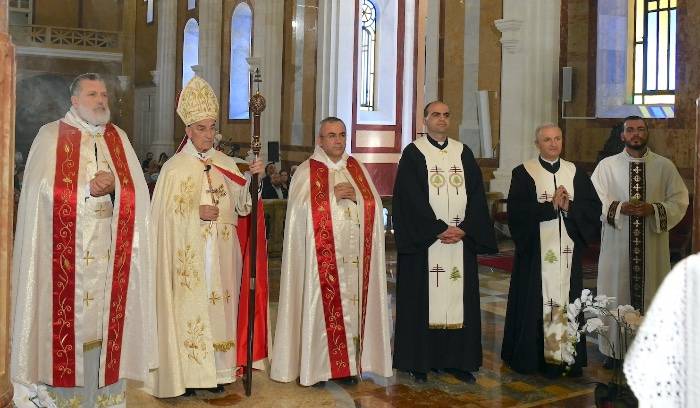
The Maronite Patriarch Bechara al-Raï (2nd from the left) during a religious celebration. (Credit: NNA)
BEIRUT — Maronite Patriarch Bechara al-Rai returned to the charge, Sunday, on the case of the arrest of the Patriarchal Vicar of Haifa and Jerusalem Archbishop Moussa al-Hage, calling on the authorities not to label Lebanese living in Israel "agents." In his Sunday homily, Rai also castigated, once again, the delays in the formation of the new government, accusing the "people concerned," the president and the prime minister-designate, of taking the issue "lightly."
Here's what we know:
• "What happened with Archbishop Moussa al-Hage is an examination by the authorities to see how far they can go against the Maronite Church. Some people complain about the intervention of religion in the state, but today they are attacking a founding confession" of the state, Rai said. "We demand [from the authorities] that they stop calling Lebanese citizens who live in the occupied territories 'agents.' If they don't, they will cause great harm to our parishes in the Holy Land," he continued, warning of "the danger" if the Maronite bishops can no longer visit their parishes, some of whose members include, in addition to Lebanese refugees in Israel, Maronites who lived in Palestine before 1948.
• More than 10,000 Lebanese from the Christian, Druze and Shiite communities fled to Israel in May 2000 as Israel withdrew from South Lebanon, ending its occupation of the area. Over the past 20 years, more than half of those have left Israel either to return to Lebanon or to settle in a third country. Those who decided to return to Lebanon served various prison sentences and lost their civil rights. Last week, caretaker Justice Minister Henri Khoury announced his intention to relaunch the work of the ministerial committee in charge of finding a mechanism for the processing of the files of those Lebanese wishing to return to the country.
• "We are the first to respect the law and justice," said the patriarch, asking officials to return Archbishop Hage's passport and allow him to cross the border at Naqoura "without arrest or inspection."
• The archbishop was arrested 10 days ago by the General Security when he arrived in South Lebanon from Israel. Hage was interrogated for 13 hours by the Lebanese authorities while carrying $460,000 and medicines that the church says were donated by Lebanese of various faiths residing in Israel for their relatives in Lebanon. In an interview with L'Orient-Le Jour, the archbishop said his detention was intended to send "a strong message to the patriarch," whose relations with the pro-Iranian Hezbollah, which wields vast influence over the Lebanese state, are stormy.
• Regarding the formation of a new government, on which no progress has been made since the only visit of the Prime Minister-designate Najib Mikati to Baabda at the end of June, the patriarch criticized the fact that the "regime" behaves in this matter as if it were only a "detail in the structure of the Lebanese system." Rai said, "the appointment of a prime minister[-designate] has value only if it is followed by the establishment of the cabinet," adding that he was "surprised that the people involved in this file do not care, which is a violation of the Constitution and Taif. "What we fear is that if the political forces fail to form a government, so [too] will they fail to elect a president," he continued. President Michel Aoun's term expires on Oct. 31.
• Since his meeting at the Presidential Palace in Baabda on June 29, during which he submitted to the president a governmental proposal consisting of a reshuffle of his current cabinet, in which he replaced, among others, the energy minister (a Greek Orthodox close to the Aounists), Nagib Mikati has not met with the president.
• The patriarch also referred to the tensions that broke out this weekend between residents of Rmaish, a predominantly Maronite village in southern Lebanon, and armed elements of Hezbollah, saying he was "sorry" about such an incident. "We call on the security forces to do their duty and protect our people in accordance with UN resolution 1701, which prohibits any armed force from being" in the Rmaish area. Resolution 1701, which aimed to end the 2006 war between Israel and Hezbollah, included a provision that no paramilitary forces should operate south of the Litani River.